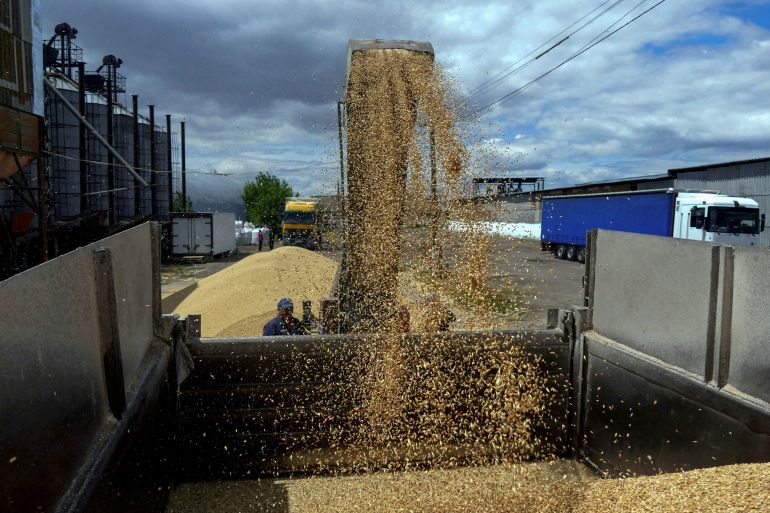Ukraine demands Poland punish protesting farmers for dumping grain
Polish farmers spilled 160 tonnes of Ukrainian produce from train wagons to protest against ‘unfair competition’.

Ukraine has called on Poland to punish those responsible for destroying 160 tonnes of Ukrainian grain in an attack at a Polish railway station.
Kyiv sent a note to Warsaw demanding that the Polish authorities find and punish the guilty, Ukraine’s Deputy Prime Minister Oleksandr Kubrakov said on X on Monday.
Keep reading
list of 3 itemsUkraine protests destruction of grain exports by Polish farmers
Polish farmers block Ukraine’s border in protest against grain imports
The official said the destruction of the grain at the railway station amid protests was an act of “impunity and irresponsibility”.
“Those who have damaged Ukrainian grain must be found, neutralized, and punished. Two friendly civilized European states are interested in this,” Kubrakov wrote.
Earlier, the official had reported that 160 tonnes of grain, en route to other countries via the port of Gdansk, had been dumped at the railway station near Bydgoszcz, in eastern Poland. It was reportedly the fourth instance of Ukrainian grain being spilled by protesting Polish farmers in recent weeks.
Those who have damaged Ukrainian grain must be found, neutralized, and punished. Two friendly civilized European states are interested in this. Such planned demonstration videos and comments have similarities with the russian hybrid war.
The @minfrastucture and the @UKRinPL… pic.twitter.com/O0corRKY2T
— Oleksandr Kubrakov (@OlKubrakov) February 26, 2024
Polish farmers have been at the forefront of the widespread protests by European farmers over recent weeks. However, they have been protesting against “unfair competition” from Ukraine for over a year.
The European Union suspended import duties, quotas and trade defence measures for imports from Ukraine in June 2022, after Russia’s war closed down many of the country’s usual grain export routes. However, the flow of cheap grain from the east quickly sparked protests by farmers and truckers in neighbouring countries.
Encouraged by the former nationalist government, which ruled until last year, Poland’s farmers and truckers have blocked border crossings and motorways.
Like peers across Europe, the new government in Warsaw has been wary of confronting farmers, apparently eyeing significant public support and the risk that a strong response to the protests could prove a boon for the far right at European Parliament elections in June.
On Friday, a Ukrainian government delegation visited the border with Poland to discuss the protests.
Prime Minister Denys Shmyhal said Kyiv had developed a five-step plan “of mutual understanding” to find a compromise for both countries.
“The blockade hits the entire Polish-Ukrainian trade and the economy of our countries. Not only Ukraine is losing from it, but Polish entrepreneurs who export goods worth $12bn annually to our market are losing from it.”
The plan outlines Ukraine’s agreement with a European Commission proposal to restrict poultry, eggs and sugar exports, including an appeal to the EU to ban Russian agrarian exports.
He added that Kyiv is also ready to apply a verification mechanism to grain, corn, sunflower and rapeseed exports.
Ukrainian President Volodymyr Zelenskyy said on Sunday that it was important for Kyiv to maintain close relations with Poland. Still, he added that his country is ready to defend businesses that had been hurt by the border blockades.
Ukrainian border service spokesperson Andriy Demchenko said on television, “Unfortunately, the blockage continues.”
“In total, 2,200 lorries are queueing on Polish territory and [Polish] farmers are letting several vehicles through per hour in both directions. More blocked are those lorries coming from Ukraine,” he said.
Burning tyres
Beyond Poland, farmers from across Europe, including France, Germany and Belgium, have been blocking roads and protesting against foreign competition, as well as environmental regulations, raised costs, and low prices for produce.
Ukraine has said blockades on its grain exports have caused severe economic losses and affected its war effort.
On Monday, tractors surrounded the EU’s headquarters in Brussels as ministers met to seek ways to streamline farming rules and red tape fuelling the protests around the bloc.
Farmers burned tyres and set off fireworks in the street. Police used water cannon to douse the flames as the ministers discussed concessions.